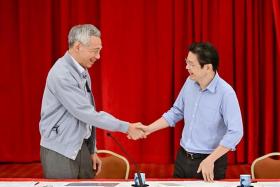Singapore to tackle issues of race, religion and fair play in society
PM Lee unveils moves to address societal issues, pays tribute to front-line workers
Singapore will squarely address the difficult issues of race, religion and fair play in society, as it refocuses on a future with Covid-19 under control.
Building on the nation's hard-won racial harmony and ensuring that economic growth leaves no one behind were key themes of Prime Minister Lee Hsien Loong's 17th National Day Rally yesterday, held both at Mediacorp and on the Zoom videoconferencing platform.
Touching on the fault lines in society that have been deepened by the pandemic, PM Lee said it was critical for Singapore to tackle its social challenges and underlying anxieties, such as the plight of lower-wage workers and disquiet over foreign work pass holders.
Many lower-wage workers, for example, were on the front line during the pandemic, which highlighted the importance of jobs such as cleaning, food delivery and security.
At the same time, these workers' precarious situation was also laid bare as they have less savings and are more likely to be laid off.
To address this, the Government will extend the Progressive Wage Model to help more workers.
"We will cover more sectors, starting with retail next year, and later, food services and waste management," said PM Lee. "We will also cover specific occupations across all sectors simultaneously, starting with administrative assistants and drivers."
Middle-income Singaporeans also face job anxiety intensified by Covid-19, said PM Lee, who noted a "growing restlessness over foreigners, particularly work pass holders".
"Concerns over work pass holders are a very delicate subject for a National Day Rally, but I decided I had to talk about it," he said.
"We have to acknowledge the problem, so that we can address Singaporeans' legitimate concerns, and defuse resentments over foreigners."
To ensure foreigners who compete for jobs here are of the right standard, the Government will continue to tighten the criteria for Employment Pass and S Pass holders by raising salary cut-offs.
TAFEP GUIDELINES
The Government will also give the Tripartite Alliance for Fair and Progressive Employment Practices (Tafep) more teeth by putting its guidelines into law and will create a tribunal to deal with workplace discrimination.
"Writing Tafep guidelines into the law is a major move: It signals that we do not tolerate discrimination at workplaces," said PM Lee.
Flagging another fault line, he said race relations have also come under stress because of Covid-19. He highlighted some recent incidents, such as that of the polytechnic lecturer who accosted an interracial couple on Orchard Road.
While the incidents have reminded the nation how fragile Singapore's racial harmony is, they do not negate its multiracial approach to nation-building.
"Our racial harmony is still a work in progress and will be so for a long time," said PM Lee.
To signal what society here considers right and wrong about racial attitudes and nudge behaviour over time, the Government will pass a Maintenance of Racial Harmony Act that consolidates in one place the state's powers to deal with racial issues.
In a nod to the ongoing Summer Paralympic Games, he congratulated swimmer Yip Pin Xiu for her gold medal in the women's 100m backstroke (S2), and Singapore's Paralympians for their good performance in Tokyo.
PM Lee also paid tribute to front-line workers such as contact tracers, ambulance drivers and vaccination centre workers who helped bring Covid-19 under control, enabling the country to now look further into its future.
"In ordinary times, we may not realise how strong Singaporeans can be," he said.
"Now, in the crisis of a generation, we have shown ourselves and the world what Singaporeans can do... they are our everyday heroes, and they are us."
Get The New Paper on your phone with the free TNP app. Download from the Apple App Store or Google Play Store now



